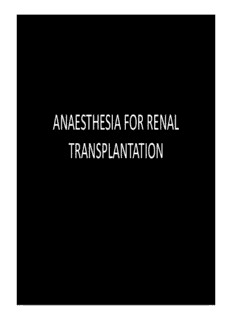
ANAESTHESIA FOR RENAL TRANSPLANTATION PDF
Preview ANAESTHESIA FOR RENAL TRANSPLANTATION
ANAESTHESIA FOR RENAL TRANSPLANTATION INTRODUCTION • In 1954, Dr Joseph Murray performed the first successful renal transplantation on identical twins • Organ survival rate has increased significantly, mainly due to improvements in immunosuppressant therapy • The 5 year survival rate in patients with transplanted kidneys is 70% compared to 30% in patients on hemodialysis INTRODUCTION • Even recipients of marginal kidney transplants enjoy higher survival and quality of life compared to patients who stayed on dialysis • Marginal transplants are considered to be grafts from older donors, HTN/DM, non‐heart‐beating cadaver donors and grafts with prolonged cold preservation time. Lemmens HLM (2004) Kidney transplantation: recent developments and recommendations for anesthetic management. Anesthesiol Clin North America 22: 651‐662. . Kapoor HS, Kaur R, Kaur H (2007) Anaesthesia for renal transplant surgery. Acta Anaesthesiol Scand 51: 1354‐136 INTRODUCTION • Minority of patients are selected for kidney transplantation after exhaustive evaluation. • Of these, most transplantation occurs in patients receiving donated kidneys from living related donors (23 per million people) compared to patients receiving deceased donor transplantation (2.5 per million people) INTRODUCTION • Median wait time ‐ 2.3 years . • During this period, patients are thoroughly evaluated and medically optimized. Medical optimization is one of the requirements to remain on the transplantation list ThDrury N (2010) Anaesthesia for renal Transplantation. Anaesthesia tutorial of the week 174: 12 e Organ Procurement Transplantation network. United States renal data system, 2011 USRDS annual data report Vol 2. National Institutes of Health, National Institutes of Diabetes and Digestive and Kidney Diseases, Division of Kidney, Urologic and Hematologic Diseases– accessed 11/20/2012 CHRONIC RENAL FAILURE • Chronic renal failure (CRF) and end‐stage renal disease (ESRD) are functional diagnoses characterised by a progressive decrease in glomerular filtration rate (GFR). • CRF occurs when GFR is reduced to 10% of normal function (20 ml min–1) and ESRD when GFR falls below 5% (10 ml min–1). • Diabetes mellitus (31%), • Chronic glomerulonephritis (28%), • Cystic kidney disease (12%), • Hypertension (9%), • Interstitial nephritis (3%) • And other diseases such as obstructive uropathy, lupus nephritis and human immunodeficiency virus CLASSIFICATION OF CKD STAGE GFR ( KIDNEY FUNCTION ml/min/1.73m2 STAGE 1 >90 NORMAL STAGE 2 60‐89 MILD IMPAIRMENT STAGE 3 30‐59 MODERATE IMPAIRMENT STAGE 4 15‐29 SEVERE IMPAIRMENT STAGE 5 <15 END STAGE RENAL DISEASE PATHOPHYSIOLOGICAL CONSEQUENCES OF CHRONIC RENAL FAILURE CARDIOVASCULAR SYSTEM • IHD leading cause of morbidity and mortality • CAD‐ 25% incidence in CKD patients • Hypertension 80% (Na, H2O retention, altered RAAS ) • Accelerated atherosclerosis (decreased plasma triglyceride clearance, HTN, fluid overload →LVH & failure.↑ plasma TG concentrations is a defect in lipoprotein lipase activity and reduced lipolysis) • ↑ metasta(cid:415)c calcific valvular heart lesions( Aor(cid:415)c 55%→ aortic stenosis 13%, MV 40%→mitral stenosis 11%) • Uraemic pericarditis CRF Hypervolemia anaemia Uraemia (salt + water reten) RAAS Pericarditis ↑TG, ↓HDL HTN Atheroscl. cardiomyopathy CAD LVH/ CAD/ LVF CHF ENLARGED, LESS EFFICIENT HEART, WORKING HARDER AGAINST HIGHER RESISTANCE, WITH LESS BLOOD & OXYGEN SUPPLY
Description: